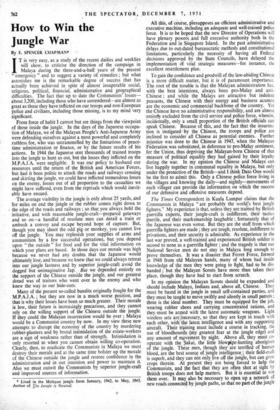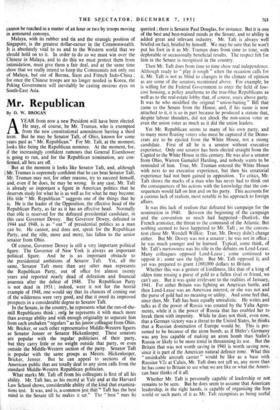How to Win the Jungle War
By F. SPENCER CHAPMAN*
T is very easy, as a study of the recent dailies and weeklies will show, to criticise the direction of the campaign in • Malaya during the three-and-a-half years of the present " emergency " and to suggest a variety of remedies ; but what astonishes me is the remarkable degree of success that has actually been achieved in spite of almost insuperable social, religious, political, financial, administrative gnd geographical difficulties. The fact that up to date the Communists' losses— about 3,200, including those who have surrendered—are almost as great as those they have inflicted on our troops and non-European police and civilians, including those missing, is to my mind very significant.
From force of habit I cannot but see things from the viewpoint of those inside the jungle. In the days of the Japanese occupa- tion of Malaya, we of the Malayan People's Anti-Japanese Army were defending ourselves against a most powerful and completely ruthless foe, who was untrammelled by the limitations of peace- time -administration or finance, or by the future results of his actions. In 1944 the Japanese sent thousands of trained troops into the jungle to hunt us out, but the losses they inflicted on the .114.P.A.J.A. were negligible. It was our policy to husband our resources until the return of the British and American Forces, but had it been politic to attack the roads and railways crossing and skirting the jungle, we could have inflicted tremendous losses on the enemy, losses out of all proportion to the casualties we Might have suffered, even from the reprisals which would inevit- ably have ensued.
The average visibility in the jungle is only about 25 yards, and for miles on end the jungle or the rubber comes right down to • the edge of the roads and railways ; so that you always hold the initiative, and with reasonable jungle-craft—prepared getaways and so on—a handful of resolute men can derail a train or ambush a convoy and escape beyond hope of capture. But, though you may shoot the odd pig or monkey, you cannot live off the jungle. You may replenish your supplies of arms and_ ammunition by a few successful operations, but you depend upon "the outside" for food and for the vital information on which your plans are based. In those days our morale was high because we never had any doubts that the Japanese would ultimately lose, and because we knew that we could always retreat into our jungle fastness and by superior jungle-craft avoid the dogged but unimaginative Jap. But we depended entirely on the support of the Chinese outside the jungle, and our greatest dread was of traitors who went over to the enemy and who knew the way to our hide-outs.
Many of the present so-called bandits originally fought for the M.P.A.J.A. but they are now in a much worse position, and that is why their losses have been so much greater. Their morale is low, their future is increasingly precarious, and they cannot rely on the willing support of the Chinese outside the jungle. If they could the Malayan insurrection would be over ; Malaya would be a Communist country by now. In my view these new attempts to disrupt the economy of the country by murdering rubber-planters and by brutal intimidation of the estate-workers are a sign of weakness rather than of strength. Intimidation is ' only resorted to when you cannot obtain willing co-operation. Clearly, then, to eradicate the Communists in Malaya we must destroy their morale and at the same time bolster up the morale of the Chinese outside the jungle and restore confidence in the administration and in our intention and power to maintain it. Also we must outwit the Communists by superior jungle-craft and improved sources of information.
* Lived in the Malayan jungle from January, 1942, to May, 1945. Author of he Jungle is Neutral. All this, of course, iresupposes an efficient administrative and executive machine, including an adequate and well-trained police force. It is to be hoped that the new Director of Operations will have plenary powers and full executive authority both in the Federation and in Singapore Island. In the past administrative delays due to out-dated bureaucratic methods and constitutional limitations, particularly the necessity of having all Federal decisions approved by the State Councils, have delayed the implementation o'f vital strategic measures—for instance, the excellent resettlement plan.
To gain the confidence and goodwill of the law-abiding Chinese is a more difficult matter, but it is of paramount importance.
The root of the trouble is that the Malayan administration has, with the best intentions, always been pro-Malay and anti- Chinese ; and while the Malays are attractive but indolent peasants, the Chinese with their energy and business acumen are the economic and commercial backbone of the country. Yet the Chinese have no administrative responsibility, and are almost entirely excluded from the civil service and police force, wherein, incidentally, only a small proportion of the British officials can speak Chinese. Because of this, and the fact that the insurrec- tion is instigated by the Chinese, the troops and police are inclined to consider all Chinese as potential enemies. Further injustice was done to the Chinese in 1947, when the Malayan Federation was substituted, in deference to pro-Malay sentiment, for the Union, thus depriving the Malayan-born Chinese of that measure of political equality they bad gained by their loyalty during the war. In my opinion the Chinese and Malays can live happily together in communal equality in Malaya, but only under the protection of the British—and I think Dato Onn would be the first to admit this. Only a Chinese police force living in the villages and knowing the daily—and nightly—movements of each villager can provide the information on which the success of our defensive and offensive measures depend.
The Times Correspondent in Kuala Lumpur claims that the Communists in Malaya "are probably the world's best jungle fighters." My experience is that, unless they are trained by British guerrilla experts, their jungle-craft is indifferent, their tactics puerile, and their marksmanship laughable ; fortunately that of the Japanese was even worse. But they are the stuff from which guerrilla fighters are made ; they are tough, resolute, indifferent to privations, and their security is admirable. As experience in the last war proved, a well-trained and experienced British soldier is second to none as a guerrilla fighter ; and the tragedy is that our National Service men do not stay in Malaya long enough to prove themselves. It was a disaster that Ferret Force, formed in 1948 from old Malayan hands, many of whom had inside knowledge of the men they were going to fight, had to be dis- banded ; but the Malayan Scouts have more than taken their place, though they have had to start from scratch.
In my opinion the Malayan Scouts should be expanded and should include Malays, Indians and, above all, Chinese. They must be based in the jungle in small self-contained parties, and they must be taught to move swiftly and silently in small patrols ; three is the ideal number. They must be equipped for the job, wearing rubber shoes and carrying concentrated rations, and they-must be armed with the latest automatic weapons. Light wireless sets areibecessary, so that they are kept in touch with each other, with the latest intelligence and with any supporting aircraft. Their trgining must include a course in tracking, the use of bloodhounds (my greatest fear at the jungle edge) and any amount of nipv ement by night. Above all, they must co- operate with the Sakai, the little blowpipe-hunting aborigines of the jungle. These men, though they' are terrified of human blood, are the best -source of jungle intelligence:, their field-craft is superb, and they can net only live off the jungle, but can grow crops therein. At present they are being forced to help the Communists, and the fact that they are often shot at sight by British troops does not help matters. But it is essential to win them over. It may also be necessary to Open up a network of new roads connected by jungle paths, so that no part of the jungle cannot be reached in a matter of an hour or two by troops moving in armoured convoys.
Malaya, with its rubber and tin and the strategic position of Singapore, is the greatest dollar-earner in the Commonwealth. It is absolutely vital to us and to the Western world that we should hold on to it. In order to do so we must win over the Chinese in Malaya, and to do this we must protect them from intimidation, must give them a fair deal, and at the same time show that we really intend to keep the Communists not only out of Malaya, but out of Burma, Siam and Frtnch Indo-China ; for once the Chinese troops are no longer needed in Korea, the Peking Government will inevitably be casting envious eyes on South-East Asia.



















































 Previous page
Previous page